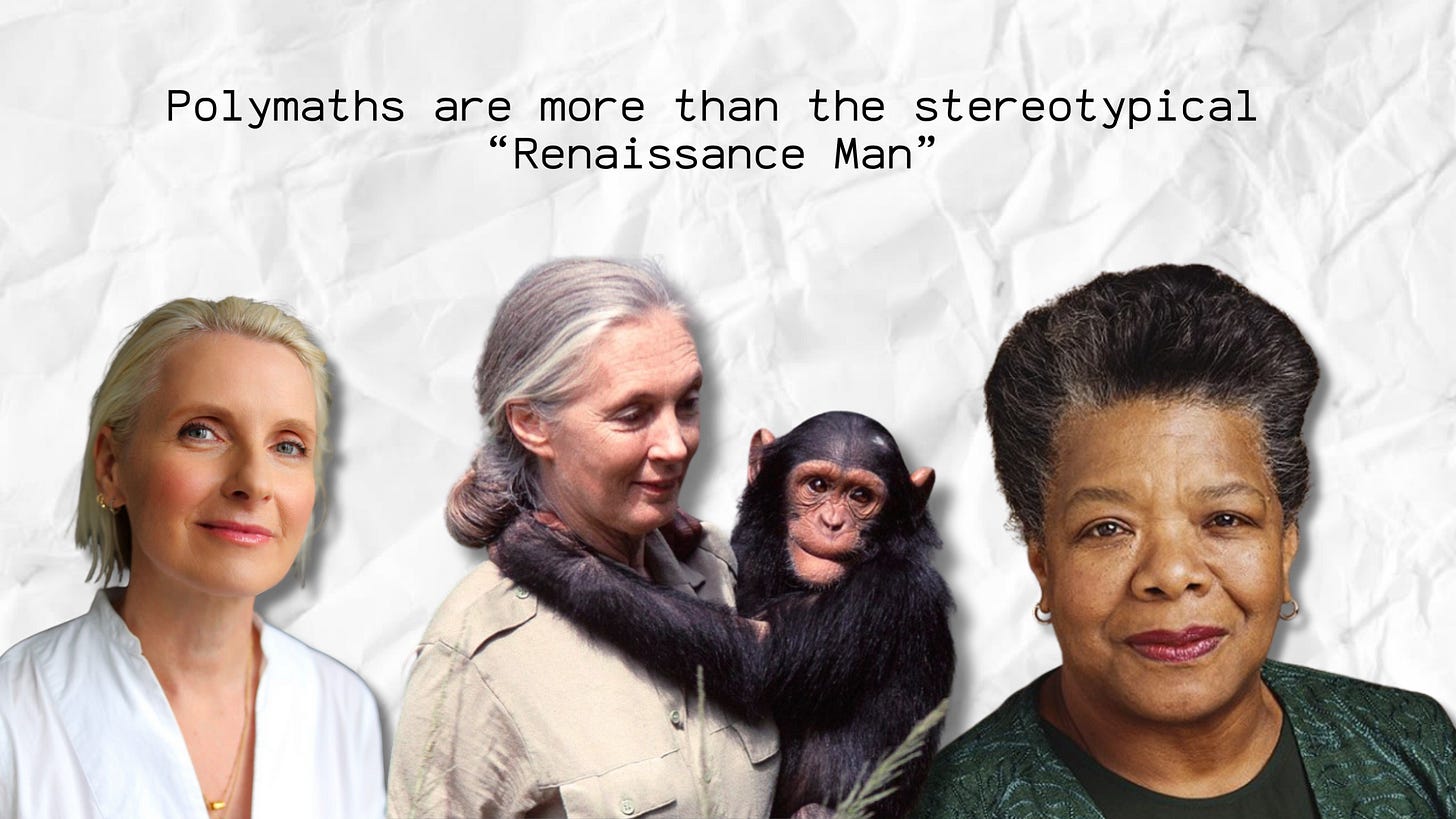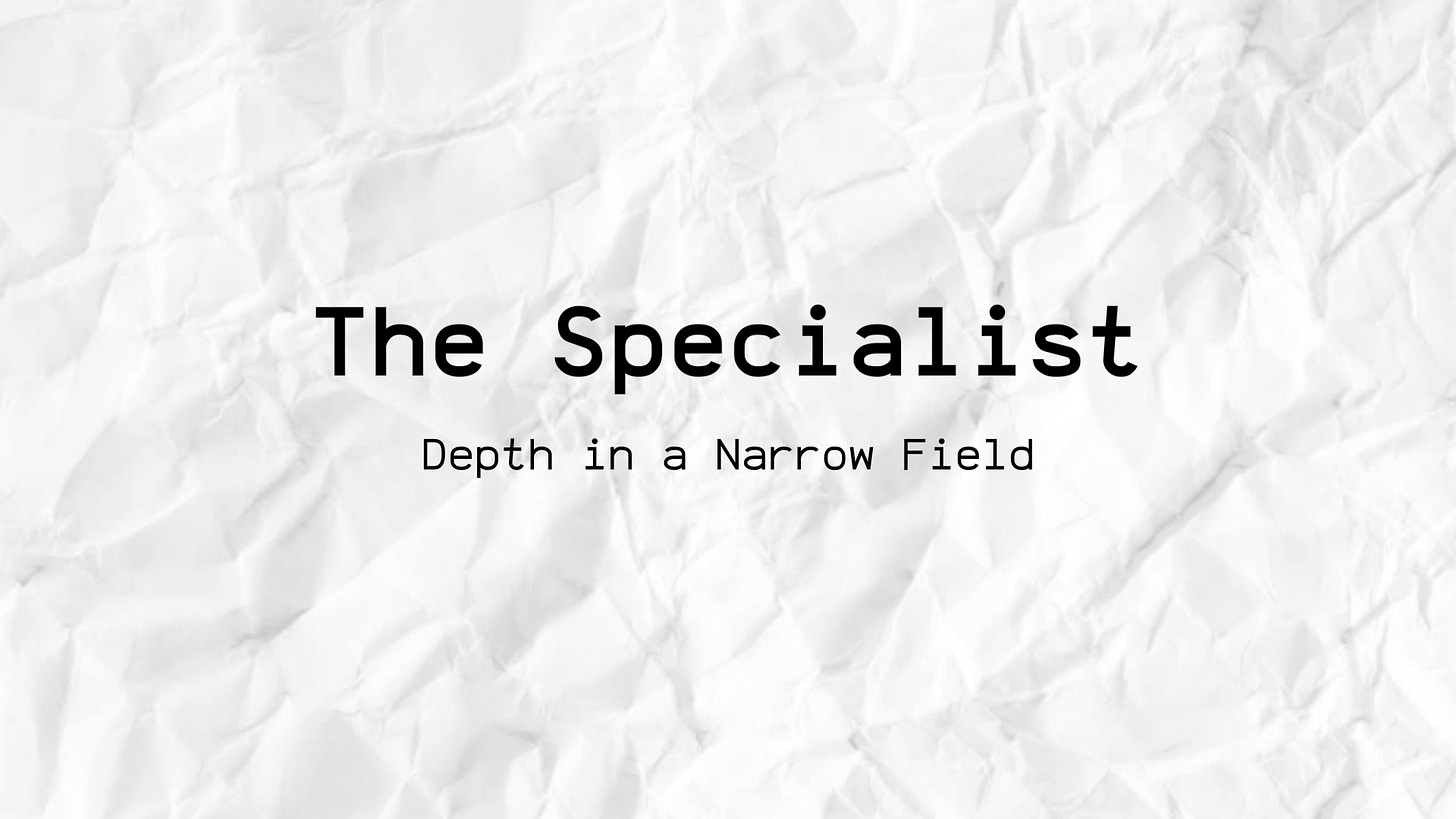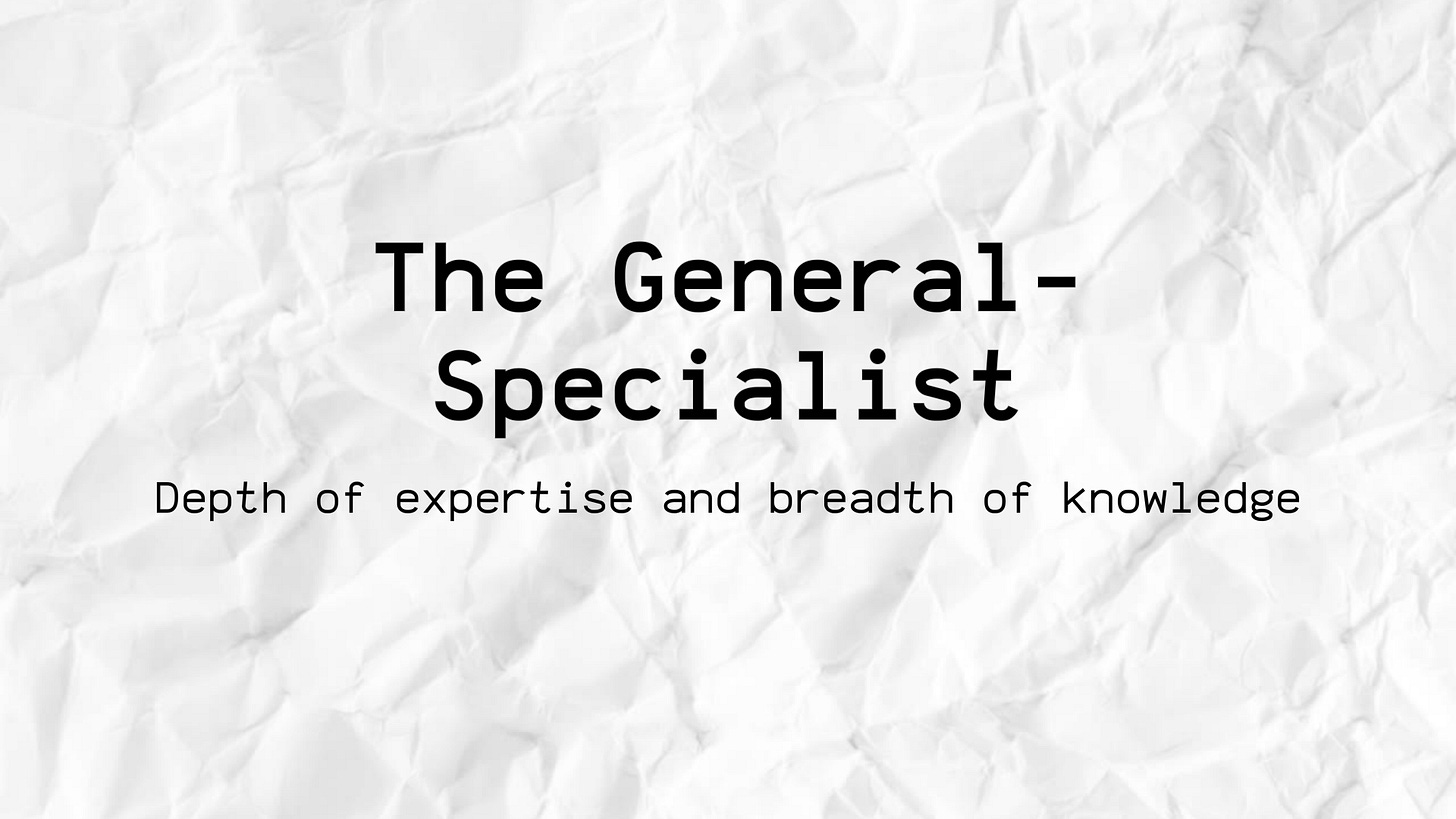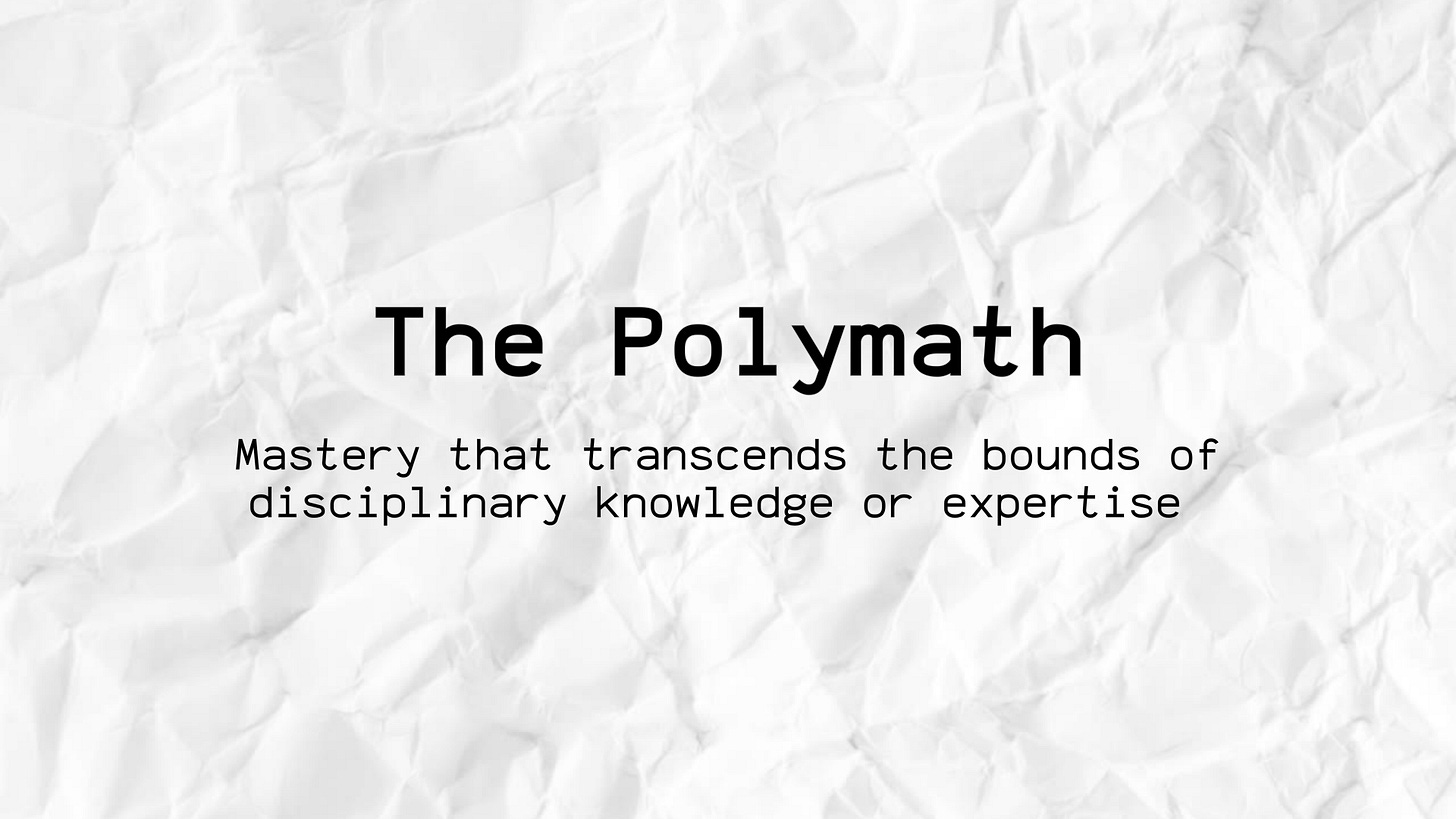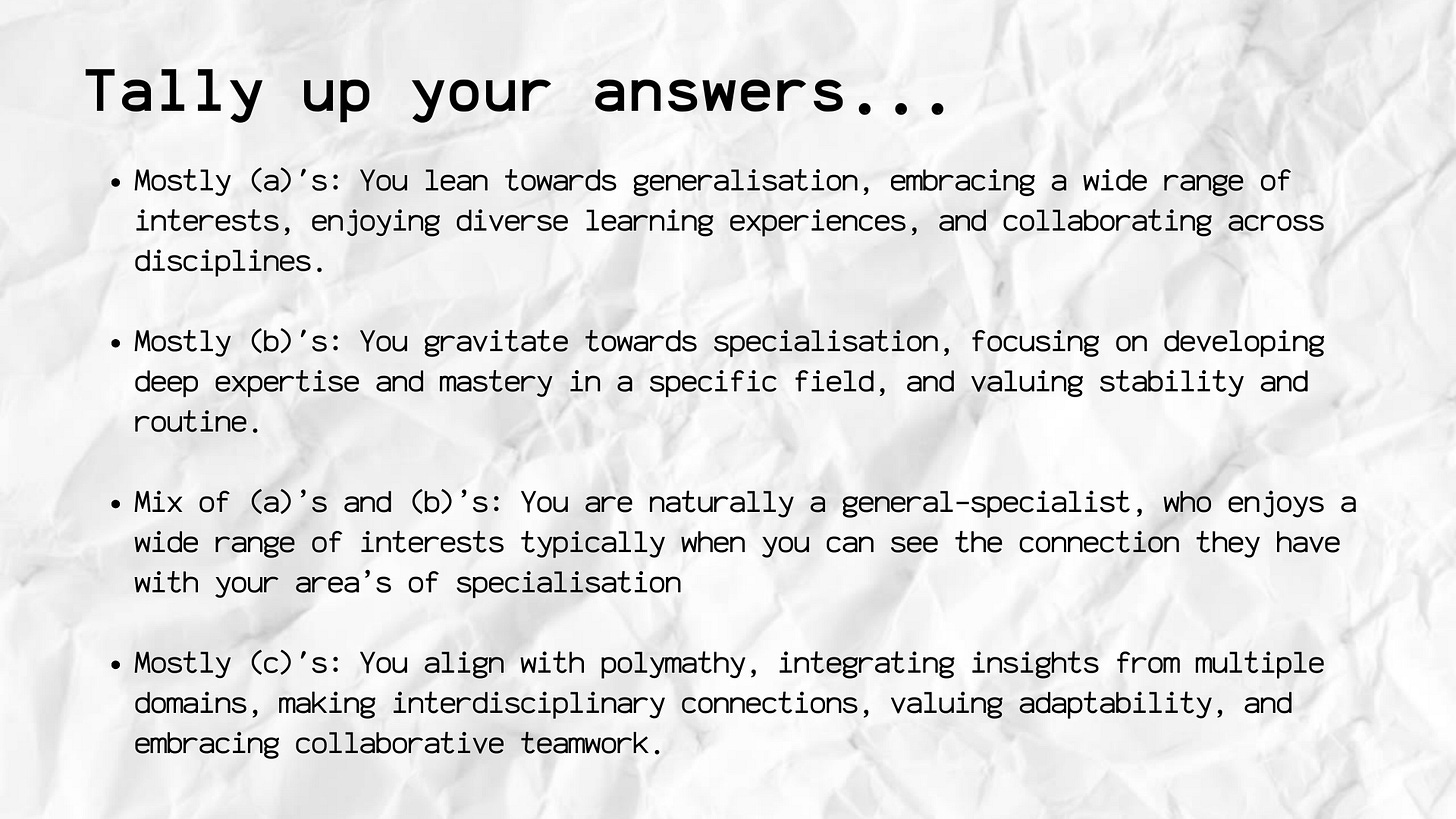A few years ago I read listened to the book Polymath: Unlocking the Power of Human Versatility, after someone at my work called me a polymath and I had no idea what it meant (seriously, I thought it was insult). I knew instantly that the path of the polymath was for me. I highly recommend this book, as it gives a great introduction to the some polymaths from history, the skills and attributes they acquired throughout their life, and their world-changing endeavours, moving far beyond the stereotype of a polymathic “Renaissance Man.”
Recently, I read the books Polymath and Learn Like a Polymath, both by Peter Hollins, which are particularly useful if you want to read something that is more ‘straight to the point’ with actionable steps.
The Evolution of Expertise: Journey from Generalist to Polymath
In the realm of knowledge and expertise, three distinct archetypes emerge: the polymath, the specialist, and the generalist. Each archetype embodies a unique approach to learning, problem-solving, and navigating the complexities of the world. In their pursuit of knowledge and expertise, individuals often embark on a transformative journey that takes them from generalist to specialist, and ultimately to polymathic mastery. This journey is marked by a progression of skills, experiences, and insights that shape their approach to learning, problem-solving, and innovation.
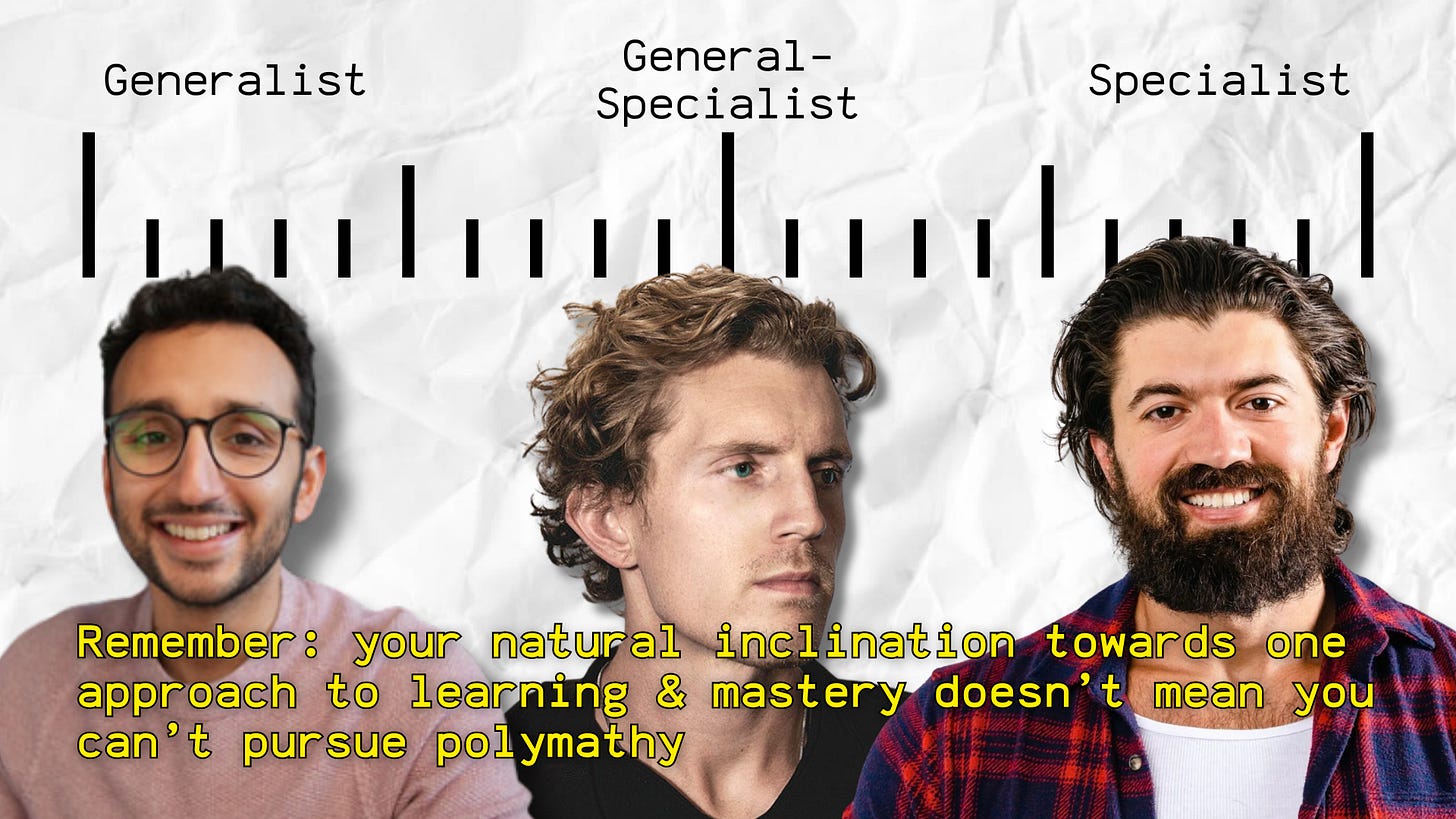
Most of us, whether by accident or intention, embody one of these archetypes, although we might combine the depth of expertise found in specialisation with the breadth of knowledge and adaptability of generalisation in different situations. Regardless, we should clearly define the characteristics of each:
The Specialist: Depth in a Specific Field
Disciplinary expert
Specialists are individuals who focus deeply on a specific field, topic, or area of expertise. They dedicate their time and effort to mastering the intricacies and nuances of their chosen domain, becoming recognised experts in their field. Specialists bring depth of knowledge and specialised skills that are invaluable for tackling complex challenges within their area of specialisation. However, their expertise may be limited in scope compared to polymaths who draw from a wider range of disciplines.
The Generalist: Jack of All Trades
Multi-disciplinary
On the other end of the spectrum, generalists are characterised by a broad range of interests and skills without delving deeply into any particular field. While generalists possess a diverse skill set and a knack for adapting to various tasks, they may lack the depth of expertise found in specialists or the interconnected knowledge of polymaths.
The General-Specialist: a mix of general knowledge & specialised skills
Inter-disciplinary
A general-specialist embodies a unique balance between specialisation and generalisation, blending deep expertise in several specific field with a broad understanding across multiple domains. This balanced approach allows individuals to delve deeply into their chosen area of specialisation while also maintaining a versatile skill set and knowledge base that spans various disciplines. General-specialists are adept at integrating insights from different fields, making interdisciplinary connections, and adapting to diverse challenges, making them valuable contributors in dynamic and evolving environments.
The Polymath: Depth of expertise and breadth of knowledge
Trans-disciplinary
While a general-specialist represents a balance between specialisation and generalisation, a polymath takes this concept further by actively pursuing expertise in multiple fields, often unrelated to each other. Polymaths thrive on diversity and complexity, seamlessly navigating across diverse domains with a deep understanding and proficiency in each area they explore. Unlike general-specialists who maintain a focused depth of knowledge within their specialisation, polymaths excel in connecting seemingly disparate disciplines, fostering innovation, creativity, and holistic problem-solving. They embody a broader and more comprehensive approach to learning and mastery, constantly seeking to integrate diverse perspectives and skills into their polymathic repertoire.
The Journey From Generalist to Polymath
Nobody is born a polymath — although most of us are born with the innate curiosity that can lead us to become polymathic — and not everyone will follow the path to become a polymath, but with enough passion (and some privilege) to have the time and resources to pursue one’s own interests throughout their life, we can all become polymaths.
Stage 1: Generalist
As children, we naturally start as generalists in our learning journey, as our education focuses on providing us with foundational knowledge across a wide range of areas. From the early years of schooling, we are exposed to various subjects such as mathematics, science, language, social studies, and the arts. This diverse curriculum aims to build a strong foundation of basic skills, critical thinking, and cognitive development. As we progress through primary and secondary education, we continue to explore different disciplines, gaining a broad understanding of the world and developing curiosity about various topics. This generalist approach to education during childhood lays the groundwork for future specialisation or polymathic pursuits, fostering a well-rounded perspective and a thirst for continuous learning and exploration.
As a generalist, individuals have a broad range of interests and skills across multiple domains. They enjoy exploring diverse topics, learning new things, and adapting to various tasks and challenges. Generalists thrive on curiosity, creativity, and adaptability, making connections between different fields and drawing inspiration from diverse sources. They possess a foundation of knowledge and skills that allows them to approach problems from multiple perspectives and engage in interdisciplinary thinking.
Stage 2: Specialist
As we transition from school to the workforce, there is often a shift towards specialisation, driven by the demand for specific skills and expertise in the professional realm. Employers seek individuals who possess specialised knowledge, technical proficiency, and industry-specific experience, viewing specialisation as a key factor in determining employability and job performance. Consequently, many individuals choose to pursue further education, training, or certifications in a particular field to enhance their professional qualifications and career prospects. Specialisation allows individuals to become specialists in their respective fields, gaining deep expertise, credibility, and opportunities for advancement within specialised industries or professions. While specialisation enhances employability and can lead to career success, it's essential to balance depth of expertise with broader skills and interdisciplinary knowledge to thrive in today's dynamic and interconnected work environments.
As individuals delve deeper into a specific field or area of expertise, they transition into the role of a specialist. Specialists dedicate their time and effort to mastering the intricacies and nuances of their chosen domain, becoming recognised experts in their field. They possess in-depth knowledge, specialised skills, and a deep understanding of complex concepts and methodologies within their area of specialisation. Specialists contribute valuable insights, innovations, and advancements that drive progress and excellence within their field.
Stage 3: General-Specialist
The general-specialist represents a unique blend of breadth and depth of expertise. General-specialists combine the diverse knowledge and skills of generalists with the specialised expertise of specialists. They excel in making connections between different disciplines, integrating insights from multiple domains, and applying a holistic approach to problem-solving and decision-making. General-specialists leverage their versatility, adaptability, and interdisciplinary thinking to innovate, collaborate, and create meaningful impact across various fields.
Some individuals, driven by curiosity, passion for learning, and a desire for versatility, choose to broaden their knowledge and become general-specialists. These general-specialists combine the depth of expertise found in specialists with the breadth of knowledge and adaptability of generalists. They excel in making connections between different disciplines, integrating insights from multiple domains, and applying a holistic approach to problem-solving and decision-making. General-specialists leverage their versatile skill set to innovate, collaborate, and create meaningful impact across various fields. By embracing a general-specialist mindset, individuals can navigate complex challenges, contribute valuable insights, and thrive in dynamic and interdisciplinary environments.
Stage 4: Polymath
A polymath transcends the conventional definitions of a generalist and specialist by embodying a multidimensional and holistic approach to knowledge and mastery. More than simply being both a generalist and a specialist simultaneously, a polymath is characterised by a deep curiosity and passion for continuous learning across diverse disciplines and domains. They possess a unique ability to integrate insights, skills, and perspectives from seemingly unrelated fields, fostering interdisciplinary connections and innovative solutions. A polymath is not limited by boundaries or labels but rather embraces complexity, diversity, and the interconnectedness of knowledge, harnessing their multidimensional expertise to make meaningful contributions and create positive impact in a wide range of areas. In essence, a polymath is a visionary thinker, creative problem-solver, and lifelong learner who embodies the essence of intellectual versatility and adaptability.
Upon entering the workforce, the pressure to specialise and focus on a specific career path often leads many individuals to prioritise immediate job-related skills and knowledge. As a result, only some people actively pursue other areas of specialisation or seek general knowledge across multiple domains. This conditioning is reinforced by traditional education systems that emphasise specialised training and certification as markers of success and employability.
Side note: there is often a degree of privilege at play in being able to pursue polymathy. Self-directed learning, which involves exploring diverse interests and acquiring knowledge outside formal education, can require additional time, resources, and self-motivation that not everyone may have access to. Factors such as financial constraints, time constraints, and lack of support or guidance can further limit opportunities for individuals to engage in self-directed learning and pursue interdisciplinary knowledge. Despite these challenges, those who do embark on a journey of self-directed learning often reap the rewards of broader perspectives, enhanced creativity, and adaptability that come with embracing diverse areas of expertise.
If they are able and committed to pursuing the path of the polymath, a person can obtain a wide range of knowledge, skills, and expertise across diverse domains. Polymaths transcend traditional boundaries, excel in integrating insights from multiple disciplines, and foster innovative thinking that drives transformative change. They embody a lifelong learning mindset, constantly seeking new knowledge, making connections between seemingly unrelated fields, and pushing the boundaries of human knowledge and achievement. While the path to polymathy requires dedication, perseverance, and a willingness to embrace complexity, those who embark on this journey unlock limitless possibilities for personal growth, creativity, and impact on the world.
Which path are you on?
You might find that you are naturally more drawn to one of these paths over others, and in a world that often emphasises the pursuit of a singular path to success, it's essential to recognise that there's no right or wrong way to live. Each individual's journey is unique, shaped by personal interests, strengths, values, and aspirations.
I think that you can be a polymath, but still be naturally inclined towards one path of learning and mastery. Whether you lean towards generalisation, specialisation, or polymathy, what matters most is finding the path that aligns with your passions and fulfils your sense of purpose, and using that to your advantage if you decide to pursue polymathy.
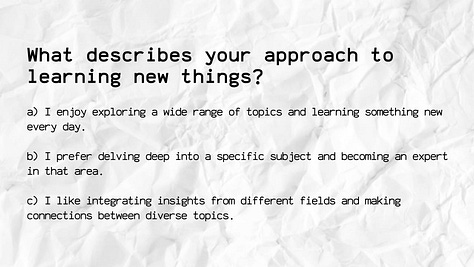
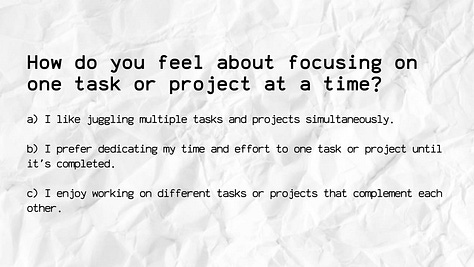
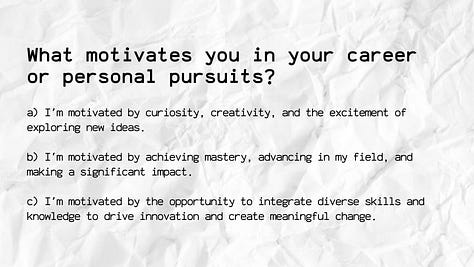
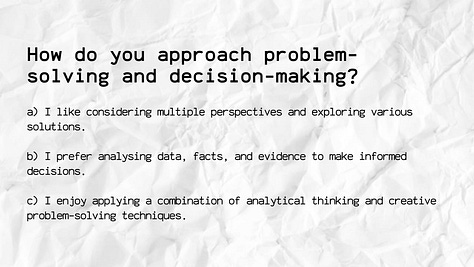
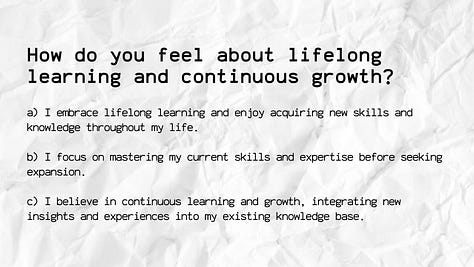
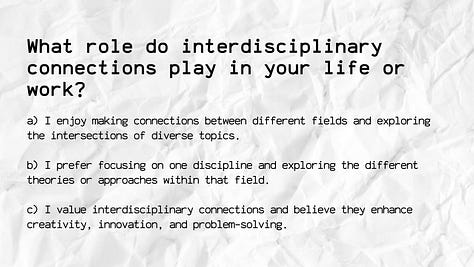
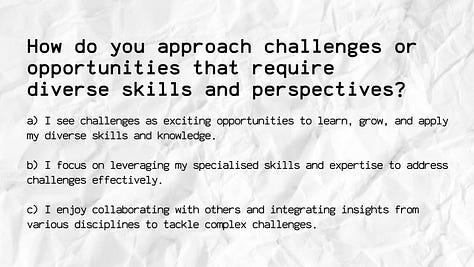
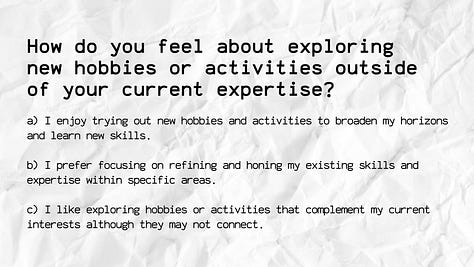
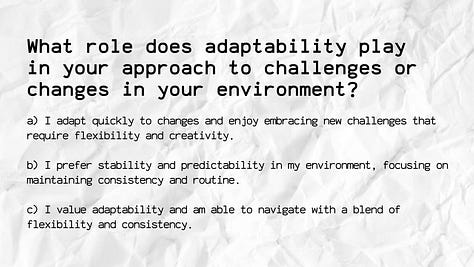
The Path of Generalisation
Generalisation involves having a broad range of interests and skills across multiple domains. If you find joy in exploring diverse topics, learning new things, and adapting to various challenges, a generalist approach may resonate with you. Generalists excel in making connections between different fields, drawing inspiration from diverse sources, and embracing a well-rounded perspective. They thrive on curiosity, creativity, and adaptability, making valuable contributions in interdisciplinary settings and cultivating a versatile skill set.
If you answer YES to most of these, you’re probably on the path of the generalist:
I enjoy exploring a wide range of topics and learning something new every day
I like juggling multiple tasks and projects simultaneously
I'm motivated by curiosity, creativity, and the excitement of exploring new ideas
I like considering multiple perspectives and exploring various solutions
I embrace lifelong learning and enjoy acquiring new skills and knowledge throughout my life
I enjoy making connections between different fields and exploring the intersections of diverse topics
I see challenges as exciting opportunities to learn, grow, and apply my diverse skills and knowledge
I enjoy trying out new hobbies and activities to broaden my horizons and learn new skills
I adapt quickly to changes that require flexibility and creativity
I enjoy collaborating with individuals from diverse backgrounds and disciplines to leverage collective knowledge and skills
Pursuing Specialisation
Specialisation, on the other hand, focuses on developing deep expertise and mastery in a specific field or area of interest. If you are passionate about delving into the intricacies of a subject, gaining specialised knowledge, and making significant contributions within a particular domain, specialisation may be the right path for you. Specialists bring depth of expertise, specialised skills, and innovative insights that drive progress and excellence in their chosen fields. They thrive on continuous learning, problem-solving, and pushing the boundaries of knowledge and achievement.
If you answer YES to most of these, you’re probably on the path of the specialist:
I prefer delving deep into a specific subject and becoming an expert in that area
I prefer dedicating my time and effort to one task or project until it's completed
I'm motivated by achieving mastery, advancing in my field, and making a significant impact
I prefer analysing data, facts, and evidence to make informed decisions
I focus on mastering my current skills and expertise before seeking expansion
I prefer focusing on one discipline and exploring the different theories or approaches within that field
I focus on leveraging my specialised skills and expertise to address challenges effectively
I prefer focusing on refining and honing my existing skills and expertise within specific areas
I prefer stability and predictability in my environment, focusing on maintaining consistency and routine
I prefer working independently and leveraging my specialised skills to accomplish tasks or projects
If you answered YES to a mix of these and the previous set of questions, you might find that you are a naturally a general-specialist.
The Path to Polymathy
Polymathy represents a fusion of breadth and depth of expertise, combining the versatility of generalisation with the depth of specialisation. If you possess a wide range of interests, enjoy making connections between different disciplines, and thrive on interdisciplinary thinking, polymathy may resonate with you. Polymaths excel in integrating insights from multiple domains, fostering innovative thinking, and driving transformative change. They embody a lifelong learning mindset, constantly seeking new knowledge, pushing boundaries, and making meaningful contributions across diverse fields.
If you answer YES to most of these, you might be on the path to polymathy:
I like integrating insights from different fields and making connections between diverse topics
I enjoy working on different tasks or projects that complement each other
I'm motivated by the opportunity to integrate diverse skills and knowledge to drive innovation and create meaningful change
I enjoy applying a combination of analytical thinking and creative problem-solving techniques
I'm motivated by the opportunity to integrate diverse skills and knowledge to drive innovation and create meaningful change
I believe in continuous learning and growth, integrating new insights and experiences into my existing knowledge base
I value interdisciplinary connections and believe they enhance creativity, innovation, and problem-solving
I enjoy collaborating with others and integrating insights from various disciplines to tackle complex challenges
I like exploring hobbies or activities that complement my current interests although they may not connect
I value adaptability and am able to navigate with a blend of flexibility and consistency
I believe in the power of collaborative teams, combining diverse perspectives and expertise to achieve shared goals and outcomes
Remember, these results are a starting point for self-reflection, and while you might be naturally inclined towards one way of learning and developing skills, your approach to life and learning can evolve over time based on your experiences, interests, and aspirations. Embrace the diversity of choices and paths available to you as you navigate your journey of growth and discovery.
Owning the Journey
Remember that your path may evolve over time, and it's okay to explore different paths or combine elements of generalisation, specialisation, and polymathy based on your evolving interests and aspirations. Embrace diversity, follow your passions, and cultivate a sense of purpose and fulfilment in your life's journey, knowing that there's no right or wrong way to live—only the path that resonates most authentically with who you are.
However, in today's interconnected world, I do believe the value of polymathy cannot be overstated, particularly for social change. As challenges become increasingly complex and interconnected, polymaths bring a unique perspective and skill set that are well-suited for navigating uncertainty, driving innovation, and fostering interdisciplinary collaboration.
While there’s no right or wrong way to live, I believe that those drawn to the path of the polymath should embrace the journey, even if our culture and systems lead us towards specialisation. Polymathy offers a powerful framework for changemakers to enhance their impact, foster innovation, and navigate the complexities of a rapidly changing world by cultivating a diverse range of skills, knowledge, and perspectives, and changemakers can unlock new opportunities, tackle challenges with agility, and lead with vision and creativity. Embracing polymathy isn't just about being well-rounded—it's about harnessing the full spectrum of human potential to create a better, more inclusive, and sustainable future for all.
The journey from generalist or specialist to polymath is not linear but a dynamic and iterative process of growth, exploration, and mastery. Each stage offers valuable lessons, experiences, and insights that shape an individual's unique path to expertise. Embracing curiosity, lifelong learning, interdisciplinary thinking, and adaptability are key principles that guide this journey. Whether you're starting as a generalist or specialist, or aiming for polymathic mastery, the evolution of expertise is a transformative and fulfilling journey of continuous growth and discovery.


